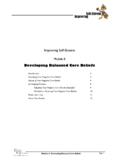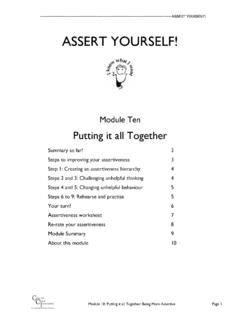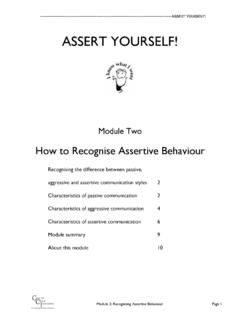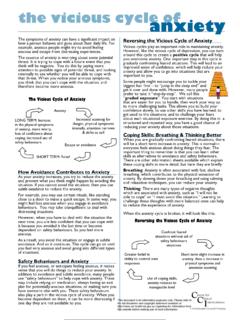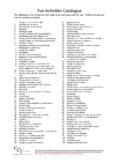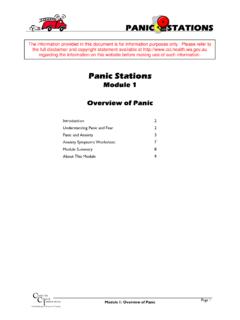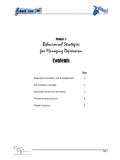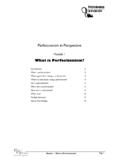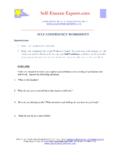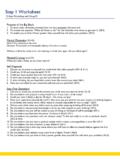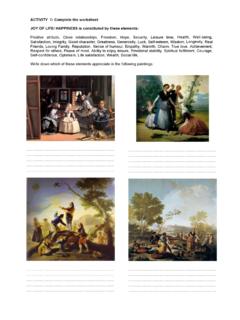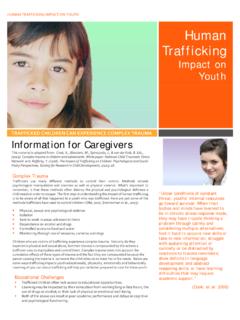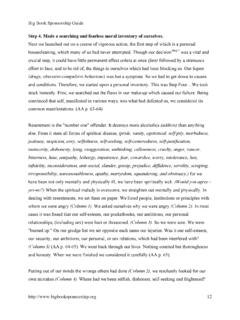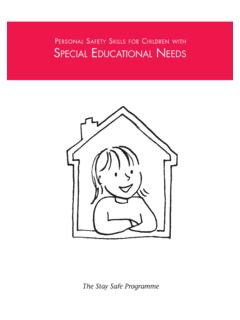Transcription of Improving Self-Esteem - Psychotherapy, Research, …
1 Self-Esteem Improving Self-Esteem Improving Improving Self-Esteem Module 2. How Low Self-Esteem Develops Introduction 2. Facts & Opinions 2. Early Life Experiences 2. How the Past affects the Present: Negative Core Beliefs 4. Protecting Ourselves: Rules & Assumptions 5. Rules & Assumptions Guide Behaviour 6. Model of Low Self-Esteem : How Low Self-Esteem Begins 7. Worksheet Low Self-Esteem : How It Begins 8. Module Summary 9. About This Module 10. C entre for CI linical nterventions Module 2: How Low Self-Esteem Develops Page 1.
2 Psychotherapy Research Training Self-Esteem Improving Introduction In Module 1, we said that people with low Self-Esteem hold deep-seated, basic, negative beliefs about themselves and the kind of person they are. These beliefs are often taken as facts or truths about their identity. In this module, we will explore how these beliefs about the self develop. Facts & Opinions Before we do that, let's discuss the difference between facts and truths, and opinions. The dictionary definition of fact is a piece of information presented as having objective reality.
3 This means that a fact has evidence that says it is real there is no doubt about it. An opinion is a view, judgment, or appraisal formed in the mind about a particular matter. An opinion is how someone perceives something, and this view may be unique to them. Let's have a few examples to better illustrate the difference between facts and opinions. I have green eyes is a fact. I like blue eyes is an opinion. Why? Because someone else might say, I like hazel eyes. I am a mother, I have a car, I live in Perth, Western Australia are facts.
4 These statements can be checked and verified. Having heaps of money is really important, Job satisfaction is about doing as little as I can get away with, There is nothing wrong with combining drugs and alcohol, . are opinions. Facts cannot be challenged, but opinions can be biased, inaccurate, mistaken, and unhelpful. Our ideas of ourselves, the judgements that we make of, and the value we place on, ourselves as people are opinions, not facts. However, we often take these opinions as truth or facts and thus, believe in them very strongly.
5 Therein lies the problem! So, where do these beliefs and opinions of ourselves come from? How did we develop these beliefs about ourselves? Early Life Experiences Beliefs about ourselves are learned as a result of the experiences we have had in our lives, especially our early life experiences. Often, the beliefs we have about ourselves are conclusions we arrive at based on what has happened in our lives. This means that at some point in time, it made sense to have those beliefs. Down the track, we'll explore whether or not such beliefs are helpful in the present, but first, let's discuss how we develop our beliefs about ourselves.
6 We learn things in different ways. We may learn from direct experiences, the media, observing what other people do, and listening to what people say. This will continue throughout our lives but beliefs about ourselves are often (though not always) developed earlier in life. This means that our experiences in our childhood, family of origin, the society we lived in, schools we went to, and with our peers have influenced our thoughts and beliefs about all sorts of things, including ourselves. If we have arrived at very negative thoughts and beliefs about ourselves, it is likely that we have encountered a variety of negative experiences that might have contributed to this.
7 We will now talk about what some of these negative experiences might be. Punishment, Neglect, or Abuse How we were treated earlier in life affects the way we see ourselves and who we are. If children are mistreated, punished frequently in an extreme or unpredictable manner, neglected, abandoned, or abused, these experiences can leave some emotional and psychological scars. It is not surprising, then, that a person who has had these sorts of experiences in their earlier life can come to believe very negative things about themselves.
8 C entre for CI linical nterventions Module 2: How Low Self-Esteem Develops Page 2. Psychotherapy Research Training Self-Esteem Improving Difficulty in Meeting Parents' Standards Experiencing less extreme punishment or constantly being criticised can also have a negative effect. If your parents, carers, and family members often focused on your weaknesses and mistakes and rarely acknowledged your positive qualities or successes (perhaps saying things such as You could have done better, or That's not good enough ), or if they frequently teased you, made fun of you, and put you down, you might also come to believe some negative things about yourself.
9 Not Fitting In at Home or at School Some people may have experienced being the odd one out' at home or at school. They might have been less intelligent than their siblings at home or had different interests, talents or skills to others in the family (such as being artistic, musical, sporty or love mathematics, science, arts). Although they might not have been criticised for their different interests or abilities, these might not have been acknowledged. At the same time, the activities or achievements of their siblings or peers might have been praised or celebrated.
10 As such, they might come to believe thoughts such as I'm weird, I'm odd, or I'm inferior.. Difficulty in Meeting Peer Group Standards During late childhood and adolescence, our experiences with our peers and people around our age can also influence how we see ourselves. This is a time when physical appearance may be very important to the young person. Together with messages conveyed by the media, an overweight, plump, or well-built' young person who has not had many positive experiences with their peers can come to believe I am fat and ugly, I'm unattractive, or I'm unlikeable.
